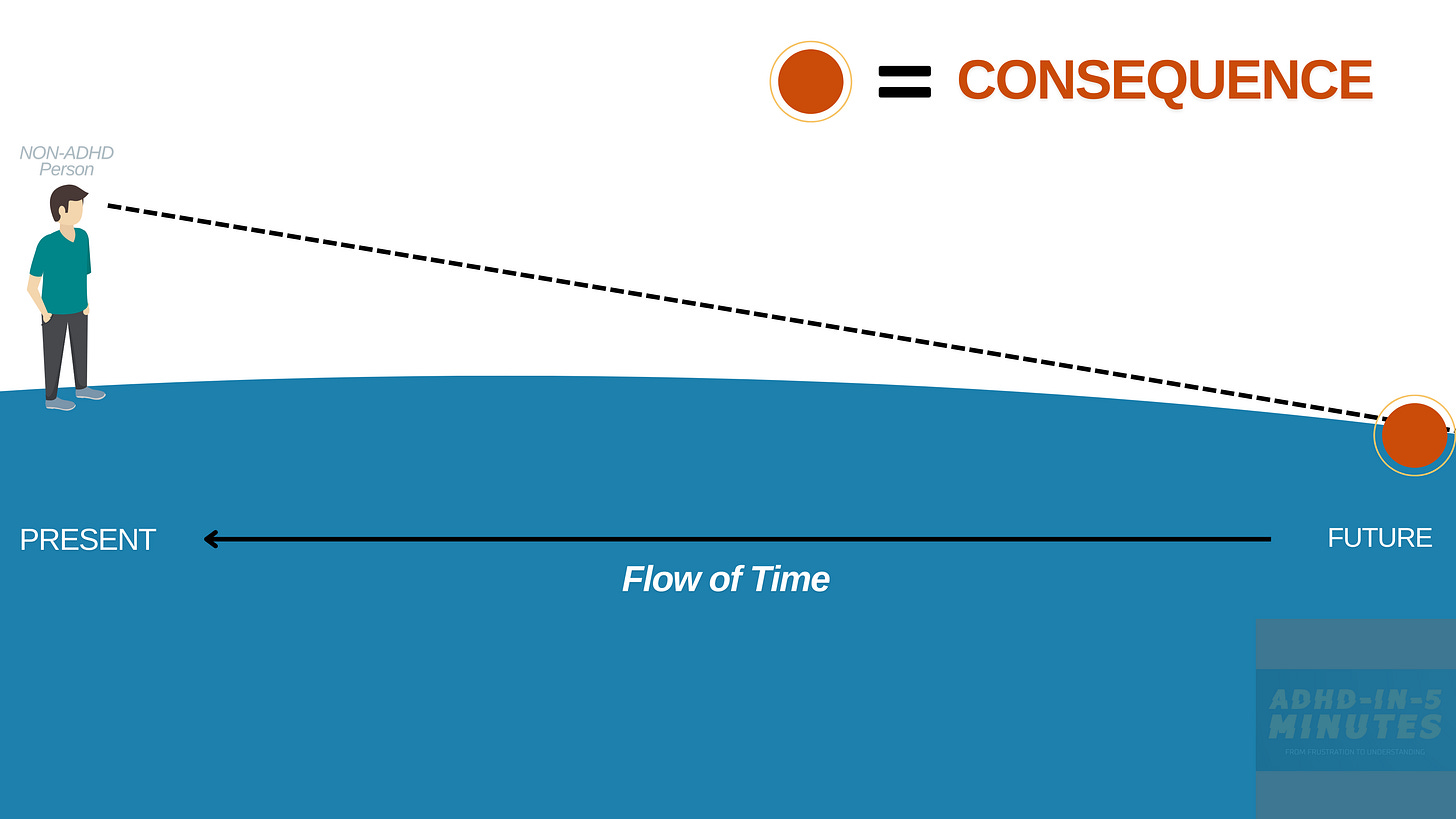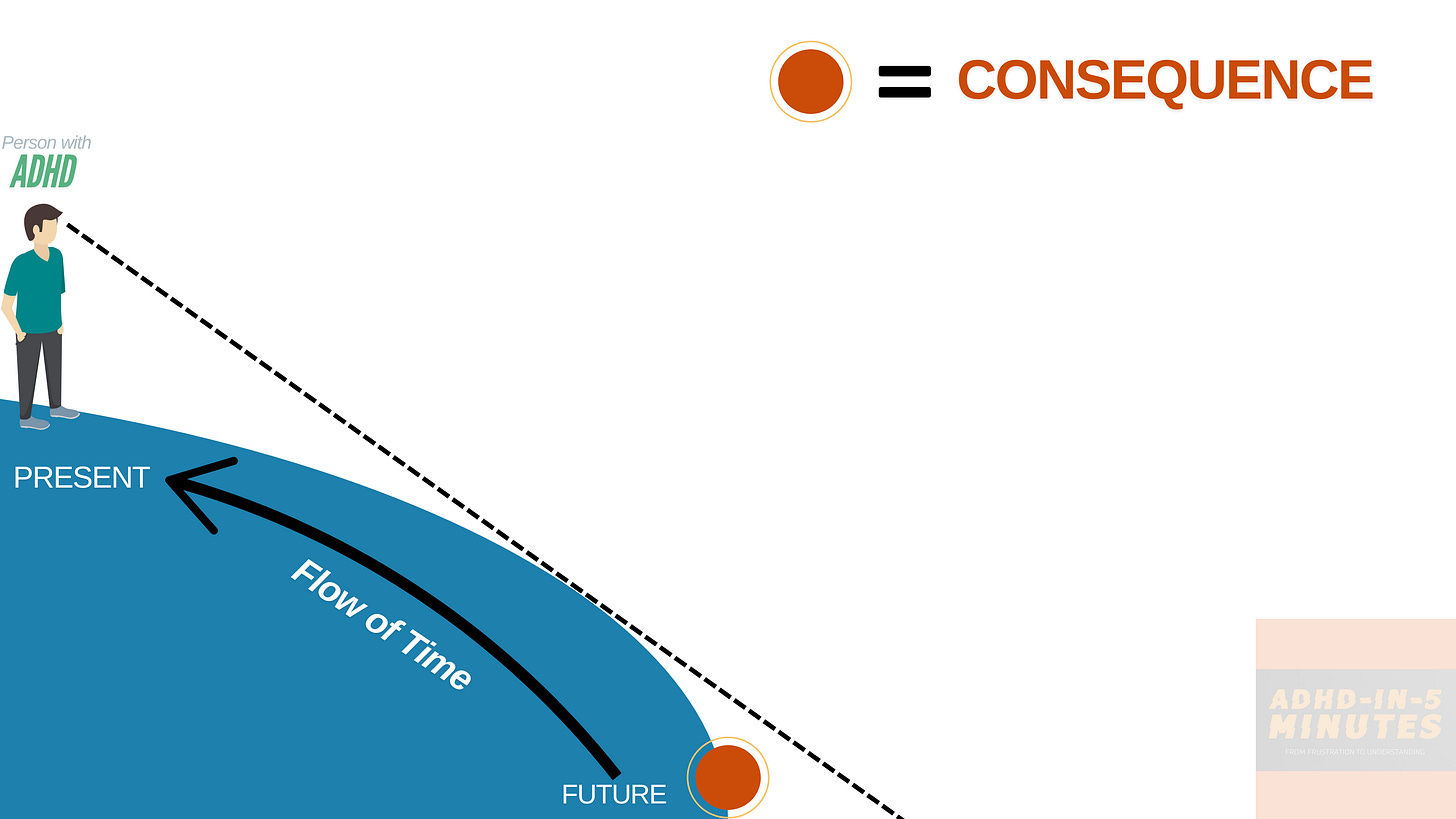ADHDers: "Time Blindness" Is Not What You Think It Is
ADHD in 5-Minutes: From Frustration to Understanding [#004]
You know that feeling when you're sitting there thinking:
"I should really start that presentation soon…" while eating pizza for breakfast, and then suddenly an email dings your inbox “Checking In about Tomorrow’s Presentation”,
Or when you're in a terrible mood and it feels like it's going to last forever, so you might as well doom-scroll until further notice?
Yeah, that's not actually about willpower or character flaws. That's your ADHD brain trying to “see” into the future with what amounts to really bad vision.
If you search online to learn more about ADHD, you're definitely encountering information about "time blindness," which is generally described as a difficulty perceiving and managing time accurately. But here's what I've discovered after working with hundreds of ADHDers: you're not time blind—you're time nearsighted. And that distinction really really matters.
If you're an ADHDer, you are likely experiencing two or more (or all) of the following:
Regularly misjudge how long chores, projects, or daily routines will take—sometimes by half or more;
Hours disappear in hyperfocus or drag on during boring tasks, making it hard to feel how much time has actually elapsed;
Appointments, deadlines, or recurring obligations slip your mind because they never feel "real" until they're looming or already past;
Start getting ready essentially at departure time, underestimate travel or transition time, and frequently arrive late or in a panic;
Create agendas without buffer time, double-book yourself, or freeze when asked to map out a project because time requirements feel unknowable.
Given all these variations, your experience can range dramatically compared to another ADHDer. And this is one of the reasons the term "blindness" was used to describe this phenomenon: just like someone who lives with a visual impairment, understanding the kind and degree of that impairment leads to a specific prescription so their lenses compensate. The wrong lenses can have some serious impacts if they aren’t made for the user.
What I've found is that ADHDers aren't totally "blind" to time so much as they are nearsighted, which means we can see time in the here-and-now with perfect clarity, but cannot see (and thus respond to) consequences, events or goals that exist far into the future.
Everyone's perception of time functions similarly: the "future" exists beyond a horizon, which means we can see up to a certain distance, but eventually it drops off and we can't see what's beyond.
So, why does this matter?
The ADHD brain can't "see" as far into the future because our time horizon is much closer than it is for neurotypical brains. Some appointments, deadlines, events, goals, or consequences technically exist but cannot be seen because they sit beyond our shortened horizon.
This is where some visuals and storytelling might be helpful.
A Tale of Two Time Horizons
Here you are, a neurotypical person, standing in the present moment, trying to envision an approaching consequence several weeks off.
As you look out into the future, you can clearly see a large consequence in the distance on your time horizon.
In this moment, you feel an urge to respond and make a series of impactful but small actions that will ensure the consequence doesn't hit you (even if you forget about it). After adjusting course, you go about your day knowing there's plenty more time to react if necessary.
The end.
Here you are, an adult with ADHD, standing in the present moment, trying to remember what you have to do tomorrow.
As you look out into the future, you can clearly see…nothing on the horizon. Hmmm, weird. You definitely feel uncomfortable (without knowing exactly why), so you pull out your phone and start watching YouTube shorts until that feeling passes.
The end…
…
…
…
…just kidding.
A few consequences have just swung over your time horizon and are approaching fast, sending you into a quasi-paralyzed state until they hit you in a staggered sequence…
…after your heart stops racing and your ears stop ringing, you survey the damage and roughly estimate this is going to cost several hundred dollars, a reprimand at work, and four sleepless nights of crippling anxiety.
The end.
Why This Insight Matters
This reframe helps us understand ADHD's unique experience of procrastination, emotional regulation, self-care, and discipline. It feels like some things either take a couple of minutes or forever…so might as well "wait" a little longer to do that thing that'll take forever anyway.
Unfortunately for us ADHDers, it's not as apparent to others that we are living with a kind of nearsightedness. Our difficulties in seeing consequences or events in the future are often misattributed to willful choice, carelessness, or moral failing…
When the reality is much simpler: we just need the right tools to see what's coming. And once you know you're nearsighted in this way, you can stop blaming your character and start building the supports that actually work.
Thanks for reading this far!!
Next week I'll be sharing a guide on how to build future-friendly spaces for ADHDers that'll build off today's issue of ADHDn5.
If you found this issue insightful, please consider subscribing! :)
And, please comment with personal observations, questions, or topics about ADHD you'd like myself or the community to expand on!
Until next week, and as always, sending you good vibes.
Cheers,
Michael




Le sigh. A life time of learning around this
Very helpful way of explaining it. I feel seen…